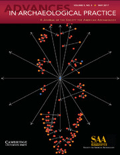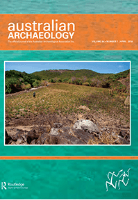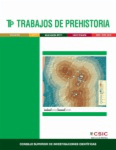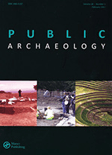
Advances in Archaeological Practice
Scope & Guideline
Elevating Archaeological Scholarship to New Heights
Introduction
Aims and Scopes
- Innovative Methodologies:
The journal emphasizes the development and application of new methodologies in archaeological research, including digital tools, remote sensing technologies, and statistical analysis. - Ethics and Inclusivity:
A consistent focus on ethical practices in archaeology, particularly regarding the treatment of Indigenous communities and the management of archaeological collections. - Public Engagement and Education:
Promotes the importance of engaging the public in archaeological practices, advocating for educational approaches that enhance the understanding of archaeology within various communities. - Interdisciplinary Approaches:
Encourages collaboration between archaeology and other fields such as anthropology, digital humanities, and environmental science, fostering a holistic understanding of archaeological contexts. - Data Management and Accessibility:
Focuses on improving the management, accessibility, and usability of archaeological data, stressing the importance of open data and reproducibility in research.
Trending and Emerging
- Digital and Remote Sensing Technologies:
An increasing number of papers focus on the application of digital technologies and remote sensing in archaeological research, showcasing the potential for innovative data collection and analysis. - Ethical Collaboration with Indigenous Communities:
There is a growing emphasis on ethical practices in collaboration with Indigenous communities, highlighting the importance of community involvement and respect for cultural heritage. - Data Science and Machine Learning Applications:
The integration of data science and machine learning techniques into archaeological research is emerging as a prominent theme, allowing for enhanced analysis of complex archaeological datasets. - Gamification and Public Engagement:
The use of gaming and interactive platforms to engage the public in archaeology is gaining traction, reflecting a shift towards making archaeology more accessible and enjoyable for wider audiences. - Focus on Climate Change and Archaeology:
Research addressing the impacts of climate change on archaeological sites and cultural heritage is increasingly prominent, reflecting the urgent need to understand and mitigate these effects.
Declining or Waning
- Traditional Excavation Techniques:
There has been a noticeable decrease in papers focused solely on traditional excavation methods, as the field shifts towards more innovative and interdisciplinary approaches. - Historical Artifact Recovery:
Research centered on the recovery of historical artifacts without the context of ethical considerations or public involvement appears to be declining, indicating a move towards more responsible practices. - Purely Descriptive Studies:
The journal has shifted away from purely descriptive studies of archaeological sites, favoring research that integrates analysis, theory, and practical implications. - Focus on Localized Studies:
There is a diminishing emphasis on localized archaeological studies that lack broader applicability or interdisciplinary connections, as the journal seeks to address more global or comparative archaeological issues. - Traditional Academic Publishing Norms:
The journal is moving away from conventional academic publishing norms, increasingly valuing collaborative, participatory, and community-driven research over traditional solo-authored papers.
Similar Journals

International Journal of Historical Archaeology
Unveiling the Past: Where History Meets ArchaeologyInternational Journal of Historical Archaeology, published by SPRINGER, stands at the forefront of archaeological scholarship, focusing on the intricate relationship between historical events and archaeological findings. With an impressive impact factor underscored by its ranking in the Q1 quartiles across various categories, including Archeology and History, this journal serves as a premier platform for researchers, professionals, and students alike to disseminate groundbreaking findings and theoretical advancements in the field. Although it is not an Open Access publication, the journal provides valuable insights through its rigorous peer-review process, enhancing the quality of contributions. Covering a breadth of topics from 1997 to 2024, it is vital for advancing knowledge in historical archaeology and offers an essential resource for those invested in understanding our shared past through the lens of material culture. The journal's commitment to fostering interdisciplinary discussions enriches the scholarly community and supports the evolution of methodologies and perspectives within the domain.

Studijne Zvesti Archeologickeho Ustavu Slovenskej Akademie Vied
Innovating methodologies for a deeper understanding of archaeology.Studijne Zvesti Archeologickeho Ustavu Slovenskej Akademie Vied is a leading journal in the field of archaeology, published by the SLOVENSKA AKAD VIED, ARCHEOLOGICKY USTAV, based in Nitra, Slovakia. This esteemed journal, with the ISSN 0560-2793, has established itself as a vital resource for scholars and researchers, reflecting significant academic contributions in both the arts and humanities as well as social sciences. With a 2023 Scopus ranking placing it in the second quartile (Q2) for archaeology, it showcases rigorous research and innovative methodologies, essential for advancing archaeological studies. While it is not an Open Access journal, it continues to offer valuable insights into archaeological findings, theoretical frameworks, and interdisciplinary approaches. The journal serves as a bridge, connecting local Slovak archaeology with international discourse, making it an indispensable tool for students, professionals, and academics striving for a deeper understanding of the archaeological heritage of Slovakia and beyond.

Journal of Pacific Archaeology
Connecting Scholars Across the Pacific LandscapeThe Journal of Pacific Archaeology, published by the New Zealand Archaeological Association, serves as a pivotal platform for disseminating cutting-edge research in the field of archaeology across the Pacific region. With an ISSN of 1179-4704 and an E-ISSN of 1179-4712, the journal provides a forum for scholarly discourse aimed at both established researchers and emerging scholars alike. Focusing on the rich tapestry of archaeological studies, it covers a diverse array of topics, from ancient settlement patterns and cultural practices to contemporary analyses of material culture. As an Open Access journal, it ensures that its findings are readily available to all, fostering inclusivity in academic research and enabling practitioners to share knowledge without barriers. The Journal of Pacific Archaeology is indispensable for those committed to understanding the complexities and nuances of Pacific archaeology, making significant contributions to both regional and global archaeological narratives.

Yorkshire Archaeological Journal
Exploring the Depths of Archaeological DiscoveryYorkshire Archaeological Journal, published by Routledge Journals, Taylor & Francis Ltd, stands as a pivotal resource in the field of archaeology, particularly focused on the rich heritage and archaeological research within the Yorkshire region of the United Kingdom. With a dedicated ISSN of 0084-4276 and an E-ISSN of 2045-0664, this journal provides both researchers and practitioners valuable insights into archaeological discoveries, methodologies, and theoretical frameworks. While it holds a Q3 ranking in both Archaeology (Arts and Humanities) and Archaeology (Social Sciences), its contributions remain significant for advancing discussions and knowledge within the discipline. The journal's archival depth, converging from as early as 1980 and continuing robustly into 2024, showcases a commitment to fostering academic discourse and exploration of archaeological heritage. Although it does not currently offer open access, its rigorous peer-reviewed articles make it an essential reference for academics, professionals, and students alike who are eager to deepen their understanding of archaeology and its applications.

AUSTRALIAN ARCHAEOLOGY
Fostering Critical Discussions in Archaeological Scholarship.AUSTRAILIAN ARCHAEOLOGY, published by Taylor & Francis Ltd, is a leading academic journal dedicated to the field of archaeology. With a strong reputation as evidenced by its Q1 ranking in both the Arts and Humanities and Social Sciences categories, this journal fosters the growth and dissemination of pioneering research from diverse archaeological contexts. The journal has been a vital resource for scholars and practitioners since its convergence in 2002, supporting the collective advancement of knowledge in the archaeological discipline. By offering a platform for rigorous analysis and critical discussions, AUSTRAILIAN ARCHAEOLOGY appeals to a wide audience, from established researchers to students beginning their journey in archaeology. Although it is not an Open Access journal, the insights provided are invaluable for enhancing understanding and appreciation of Australia’s rich archaeological heritage. With a Scopus ranking that places it among the top contenders in its field, this journal continues to contribute significantly to outstanding archaeological scholarship and professional practice.

Trabajos de Prehistoria
Advancing Archaeological Insights for a Deeper Understanding of Our PastTrabajos de Prehistoria is a distinguished peer-reviewed journal published by the Consejo Superior de Investigaciones Científicas (CSIC) since 1988, and it has established itself as a vital resource in the field of archaeology and prehistory. With an impressive impact factor and an open access policy, the journal aims to disseminate high-quality research that contributes to the understanding of human history and prehistorical studies. This Spanish journal has consistently ranked in the top quartile (Q1) in both the Arts and Humanities and Social Sciences categories, reflecting its significance in advancing archaeological scholarship, with Scopus rankings placing it in the 85th percentile among its peers. Covering a broad scope of topics related to archaeology, it serves as a platform for innovative research that connects researchers, professionals, and students globally, enhancing academic dialogue and fostering interdisciplinary collaboration. Based in Madrid, European researchers and global academics alike benefit from its open access model, promoting wider distribution and accessibility of foundational studies in the field.

Public Archaeology
Uncovering Stories, Engaging CommunitiesPublic Archaeology is a leading journal in the field of archaeology, published by Routledge Journals, Taylor & Francis Ltd in the United Kingdom. Established in 2004, this journal focuses on the interaction between archaeology and the public, providing a platform for discussions that bridge academic research and community engagement. With an impressive impact factor and ranked in the Q2 quartile for both Arts and Humanities and Social Sciences archaeology categories, it holds a prominent position as one of the top journals in its field, reflecting the high caliber of its published work. Researchers, professionals, and students alike will find valuable insights through its comprehensive articles and case studies that explore contemporary issues within archaeology and the implications of these on society. Despite not being openly accessible, the journal has established itself as an essential resource for innovative research and dialogue, making it an invaluable asset for anyone interested in the dynamic field of public archaeology.

ANTIQUITY
Pioneering Discoveries in the Study of AntiquityANTIQUITY is a prestigious academic journal published by Cambridge University Press that has been at the forefront of archaeological and humanities scholarship since its inception in 1927. With its roots firmly planted in the United Kingdom, the journal has achieved remarkable recognition, maintaining a Q1 ranking in both the fields of Archaeology and Arts and Humanities as of 2023. With an impressive Scopus ranking of #3 out of 173 in General Arts and Humanities and #28 out of 354 in Archaeology, it underscores its significant impact and influence in shaping contemporary discourse in these domains. Although it is not an Open Access journal, ANTIQUITY provides crucial insights into the evolution of human societies through a comprehensive range of archaeological studies, reviews, and theoretical discussions. By facilitating knowledge exchange among researchers, professionals, and students, ANTIQUITY not only enriches academic literature but also fosters a deeper understanding of our past.

Conimbriga-Revista de Arqueologia
Discovering History: Open Access to Archaeological InsightsConimbriga-Revista de Arqueologia is a distinguished open-access journal dedicated to the field of archaeology, published by COIMBRA UNIVERSITY PRESS. Since its inception, the journal has fostered a vibrant intellectual community focused on the exploration and dissemination of archaeological research, particularly emphasizing studies relevant to the rich historical and cultural heritage of Portugal and beyond. With its open access model established in 2014, it has become a vital resource for researchers, professionals, and students to share their findings without access barriers, encouraging collaboration and knowledge exchange. Despite the absence of specific metrics such as the HIndex and Scopus rankings, the journal is recognized for its commitment to high-quality scholarship and its role in advancing archaeological discourse. Positioned within the scholarly landscape, Conimbriga-Revista de Arqueologia serves as a crucial platform for the publication of innovative research, reviews, and critical essays, making it an essential journal for those invested in the archaeological sciences.

California Archaeology
Connecting Scholars to California's Archaeological TreasuresCalifornia Archaeology is a premier academic journal dedicated to the multifaceted study of archaeology within the context of California's rich historical and cultural landscape. Published by Routledge Journals, Taylor & Francis Ltd, this journal conveys cutting-edge research from 2009 to 2024 and is recognized for its impact in the field, with a commendable Q2 ranking in both archaeology and arts and humanities as of 2023. Scholars and practitioners are encouraged to disseminate their findings and insights through this journal, contributing to a deeper understanding of archaeological practices and interpretations in California. With access options designed to enhance the visibility of research, California Archaeology serves as an essential resource for professionals, students, and researchers devoted to advancing knowledge in archaeology, making it a cornerstone of academic discourse in the discipline.